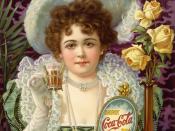In a global-oriented organization the workforce has to adapt to different cultures, often within the same organization; individuals in the organization have to learn how to do things in full respect of individual differences and culture. Companies in nations that promote global trade can expand their markets, seek out growth opportunities in other nations, and achieve production and distribution economies. They can also reduce their dependence on the economies of their home nation. But according to Schermenton, Hunt, and Osborn (2005), ÃÂas forces of globalization influences the world economy, we have to face not just the opportunities of global marketplace but problems of job losses to foreign marketplace of customers, suppliers, and employeesÃÂ. As domestic markets mature and sales growth slows, companies in every industry recognize the increasing importance of efforts to develop business in other countriesAs for Coca-Cola, global markets mean bringing in global profits. Coke is a dominant brand on every continent.
Although its U.S. market share is very impressive, it enjoys even better positions aboard, virtual monopolies marked by market shares of very high percentages in countries like Africa and Indonesia. CokeÃÂs major competitor Pepsi lags far behind in the international marketplace, with the exception of Canada, foreign sales do not produce any profits for Pepsi. The chief reason for this difference in results appears to be Coca-ColaÃÂs continuing investment in distribution and other physical resources for getting its products within armÃÂs reach of its customers; instead, Pepsi relies on creative promotions to attract their customers.
Reference:Schermerhorn, John R., Hunt, James G. &Osborn, Richard N. (2005). OrganizationalBehavior. (9th ed). John Wiley & Sons, Inc



Good
Short and to the point. Well referenced. Good Work.
0 out of 0 people found this comment useful.